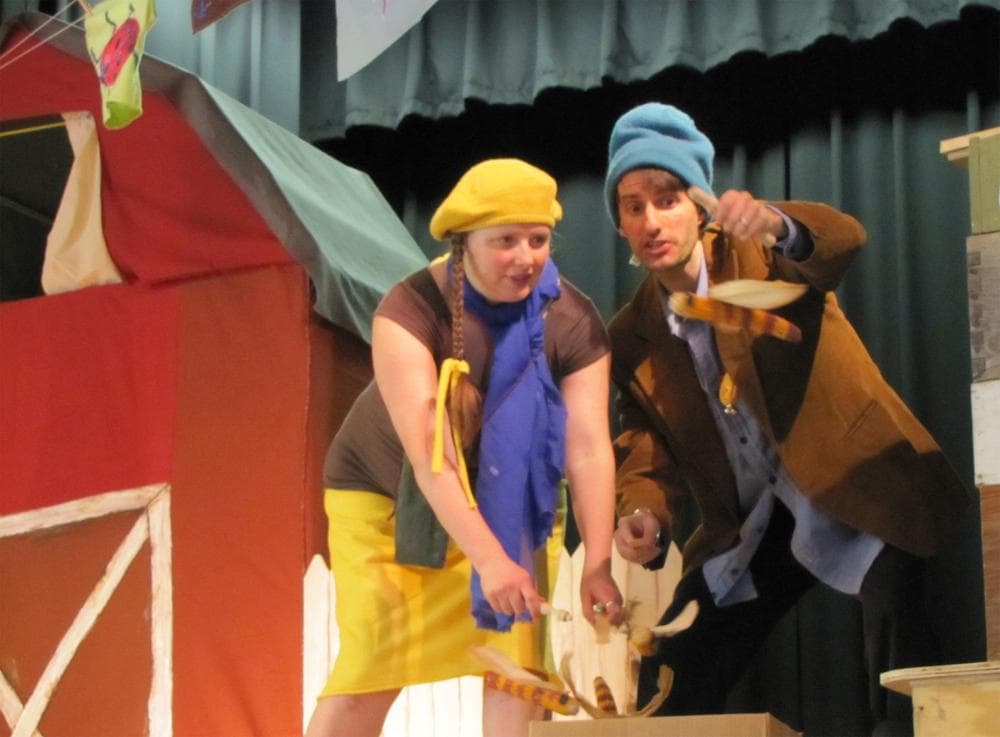Advertisement
Honey Bee Die-Off Becomes Subject Of Children's Play
ResumeEditor's Note: This story originally aired on June 1, 2012, the day before “To Bee Or Not To Bee” was to be performed at the Cambridge River Festival. But due to a massive rainstorm, the festival was canceled for the first time in its history, so the musical has been rescheduled for this year’s event — June 1, 2013 — and WBUR is reprising this interview.

BOSTON — Honey bees, you may have heard, are dying off in large numbers. Environmental scientists are trying to get to the bottom of this, and while they're doing that a western Massachusetts playwright has turned the subject matter into theater.
"To Bee Or Not To Bee," Jonathan Mirin's children's play about this mysterious population collapse, will be performed Saturday at the Cambridge River Festival.
Mirin — who runs the Piti Theatre Company in Shelburne Falls with his wife, Godelieve Richard — spoke about his play with WBUR's All Things Considered host Sacha Pfeiffer.
Sacha Pfeiffer: Jonathan, many adults are aware, I think, of the important role that bees play in the environment - pollination and so forth. But, for kids, bees are often just viewed as bad. They're something that stings them or makes them hurt. So how did you take this subject matter that kids might recoil from and try to make the bee sympathetic?
Jonathan Mirin: Well, one way is we have bees talking to each other. The bees are actually puppets made out of corn and corn stalks. We also have a moment at the end of the play where part of the advice that's been given by this wise woman beekeeper is to just stay calm when they land on you, and so kids actually practice right at the end of the show. We have these bee puppets land on them, and every kid so far that a bee puppet has landed on has stayed unbelievably calm. So all the other kids watching get this message that, "Oh, wait, maybe I don't have to be scared of bees."
So is there some subtle attempt here to, in a kid's mind, change the enemy into a friend?
Um, it's not that subtle!
It's actually quite clearly what you're trying to do?
Yeah. Part of what we also do is explain that you don't want to get in their way when they're working. They're busy and they've got things to do.
Jonathan, there's a song in the play in which a corn salesman arrives with pesticide, and this is the song that accompanies it. It's sung by Northampton singer-songwriter Carrie Ferguson:
Just a little spray
These bugs will go away
It's their unlucky day
Like an icicle in May
Given lyrics like that, is there a lesson or a message that you're trying to get across in this play, environmental or otherwise?
We definitely have a point of view about colony collapse disorder, and it has to do with feeling like the current use of pesticides around people's lawns and in U.S. agriculture and in agriculture around the world are definitely not helping bees at all. There are many other factors, and it was an interesting challenge trying to compress these different factors into a 45-minute show.
There's one point in the play where all the farmers have switched to a new pesticide that's supposed to be safer, but suddenly the bees start acting oddly. Here's the song that references that:
I'm dizzy, oh so dizzy, and I feel a little sick
And when I get back to the hive they say, "Girl, you look out of it"
I'm nervous, oh so nervous, was it something that I ate?
How do you want people to feel as they hear this?
You know, I think it's a worrisome moment. But it's also a way of making visual what's going on. When you say, "dizzy, I'm so dizzy," we humans know what that means, but when we look at a bee that's maybe not taking the nectar in as orderly as it would normally, it's sort of like, well, what's really going on? And it's really my imagination. I have no idea if bees feel dizzy or if they can feel dizzy, but that's kind of what it looked like to me when I was looking at this footage of a bee trying to take out nectar after having low doses of systemic pesticide.
This article was originally published on June 01, 2012.
This program aired on June 1, 2012.